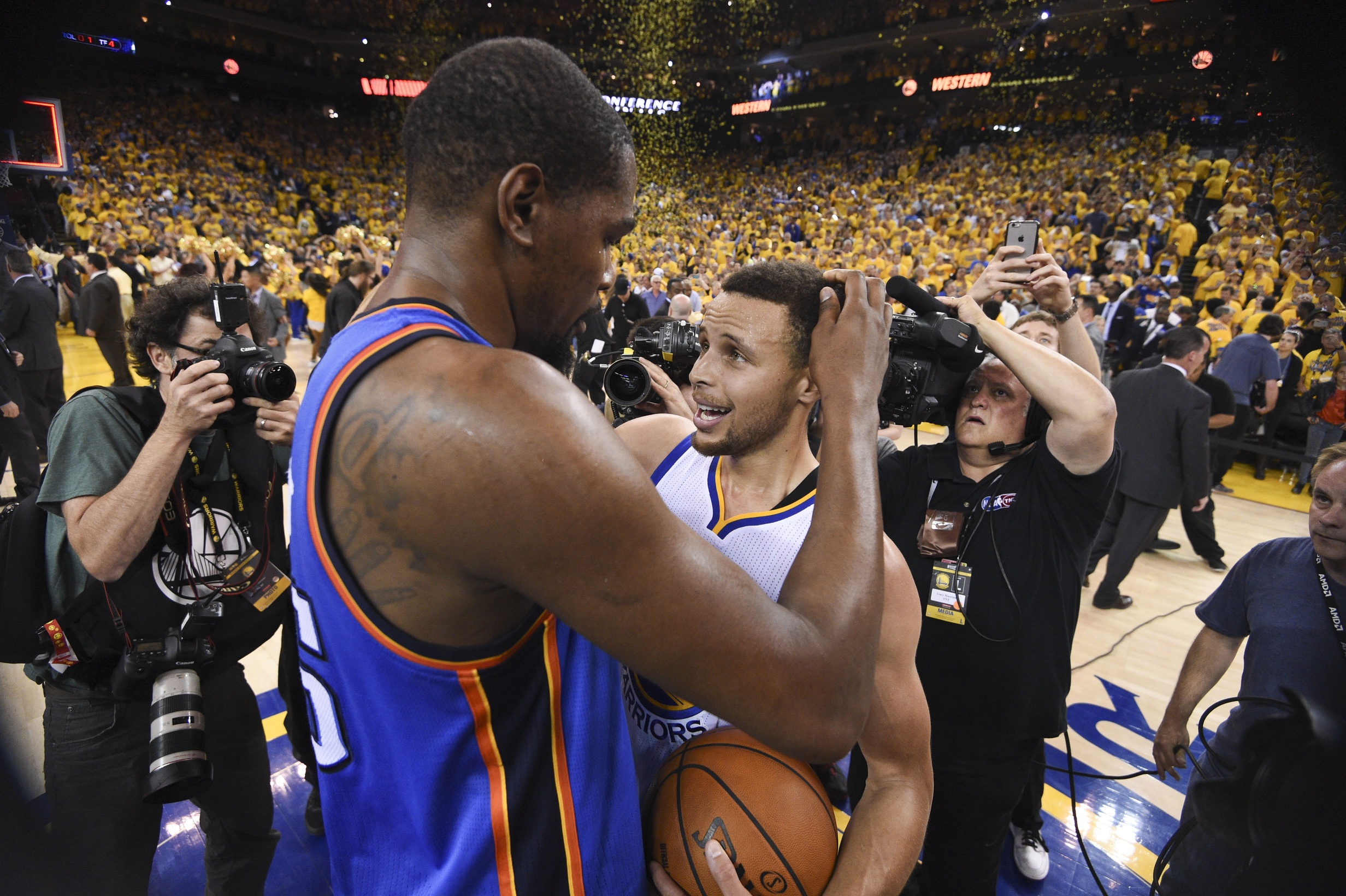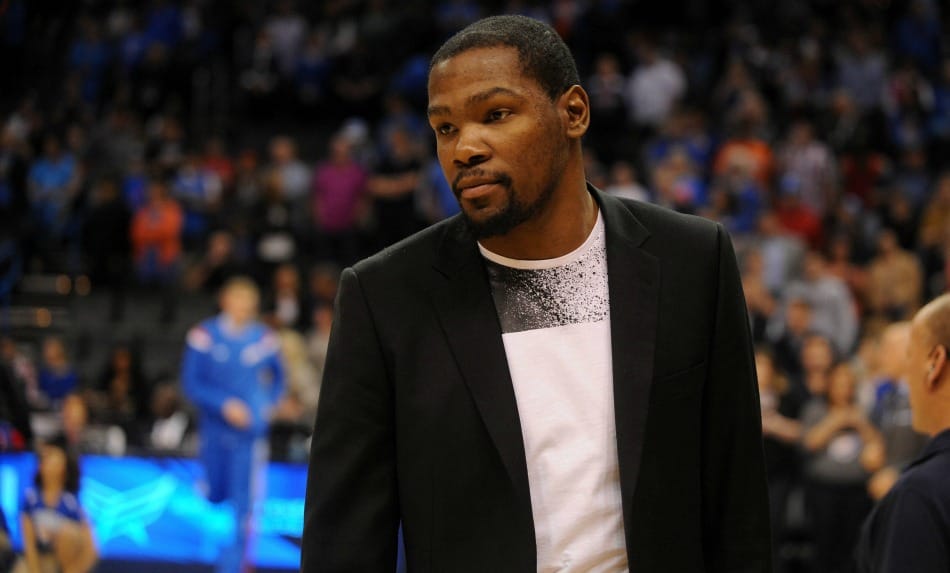
Kevin Durant shook up the entire landscape of the NBA when he decided to sign with the Golden State Warriors.
Joining a team that won 73 games this past season and has earned two consecutive trips to the NBA Finals was bound to draw criticism.
Though, the personal attacks that Durant has seen from those who covered him in Oklahoma City have gone a bit too far.
For the former MVP, the decision was based on two things. Winning and an ability broaden his horizons from Oklahoma. It was a personal decision. One that will get criticized.
But here are six reasons we shouldn’t criticize Durant for deciding to help build a super team in Oakland.
1. The loyalty narrative
This entire loyalty idea that’s been thrown around in media circles since Durant’s decision become public Monday morning is absolutely absurd.
He spent nine seasons with the Thunder organization, eight in Oklahoma City and one in Seattle. On top of this, back in July of 2010, Durant signed a five-year, $89 million extension with the Thunder — a deal that did not include an opt out clause.
Think about that for a second. Durant bypassed the opportunity to see a higher top-end contract value in each of the past two summers where his annual salary would have increased by $5 million per season.
“But there was always concern that Durant would be persuaded — that outside forces would sway him,” ESPN’s Royce Young wrote on Tuesday. “Those close to him talk about how he’s impressionable and impulsive, and the moment Durant agreed to meetings in the Hamptons, his future hung in the balance. In reality, he had one foot out the door.”
Young is 100 percent incorrect here. It wasn’t about impulsion or a gut decision made on a whim. Durant had spent nine years with the Thunder.
He had earned the MVP award once, finished runner up three more times and earned four scoring titles. He took less back in 2010 to remain committed to the team for five full seasons.
He did everything possible to bring a title to his adopted city. He put Oklahoma City basketball on the map (almost literally).
“And Durant’s legacy now is rooted in the 21st century values of asking what your franchise can do for you, not the 20th century value of asking what you can do for your franchise. Durant’s legacy is finding someone who can help him win,” Berry Tramel of NewsOK.com wrote earlier in the week.
What didn’t Durant do besides bring a title of Oklahoma? Remember, he was drafted the year prior to the franchise uprooting from Seattle. He was the face of the franchise. A new franchise. And in the end, he made it a legitimate force in the NBA.
Questioning his loyalty seems a bit absurd, as if loyalty itself is something we should be focusing on when it comes to an individual making a career choice.
So when we hear the criticism that Durant isn’t loyal, just remember he should this loyalty at a time when he surely didn’t need to.
2. Winning means something
Durant failed. He failed to bring that title to Oklahoma. This past season, that failure came after holding a 3-1 series lead against his new Golden State Warriors squad in the Western Conference Finals.
It was a bitter pill for Durant to swallow. His performance down the stretch of Game 5 helped the Warriors back in the series. His inability to work with fellow star Russell Westbrook with everything on the line could have been the final nail in the coffin of Durant’s career with the Thunder.
The Thunder made the playoffs in six of Durant’s final seven years with them, maxing out in 2011-12 with a trip and eventual loss to the Miami Heat in the NBA Finals.
Since that lockout-shortened season, Durant’s Thunder failed to live up to expectations.
Despite winning 60 games in 2012-13, Oklahoma City fell to the Memphis Grizzlies in the second round. Then, the following season, a 59-win Thunder team lost to the San Antonio Spurs in the conference finals.
After an injury-shorted 2014-15 campaign, the Thunder moved on to a new era with Billy Donovan replacing Scott Brooks on the bench. Unfortunately, all roads led through the 73-win Warriors in the Western Conference.
Sure Durant is to blame for this lack of postseason success. He was the best player on one of the most-talented teams in the Association. Not being able to bring that title home surely will impact his legacy.
But to Durant, it’s all about winning. He didn’t see a path to success in Oklahoma any longer. He saw a team that was seemingly falling behind others in the conference.
He saw Russ’s contract and knew that his teammate was going to be a free agent next summer.
 this year, Durant’s only real option with the Thunder was the same two-year deal he signed with Golden State — a contract that gives him an opt out next summer.
this year, Durant’s only real option with the Thunder was the same two-year deal he signed with Golden State — a contract that gives him an opt out next summer.
Throughout this entire process, the talking points from Durant’s team included the line that he didn’t want to go through this entire free agent thing again. He wanted to settle down.
If he had returned to the Thunder, the very same courting process we saw this past weekend would have occurred again.
Durant may opt out of his deal with the Warriors next summer, but that’s purely going to be a financial decision to receive a max deal. Barring a disastrous 2016-17 campaign in Oakland, it’s readily apparent Durant’s long-term plans include Golden State. That wouldn’t have been the case if he had returned to Oklahoma.
3. The market advantage
Let’s be real for a second here, and it’s definitely not a knock on Oklahoma. When it comes to market opportunities, that region pales in comparison to the Bay Area.
We’re talking about a Northern California area that includes Silicon Valley, something that was reportedly important when it came to Durant’s decision.
We’re talking about a new stadium being built on the San Francisco waterfront just as Durant enters the latter years of his prime. We’re talking about the nation’s sixth-largest media market compared to its 41st largest.
This wasn’t lost on Durant. It couldn’t have been lost on him. Nike was in his ear. His financial advisers were in his ear. They knew. He knew.
Now take into account the fact that he’s joining an organization that worth a cool $1 billion more than the Thunder, and there’s a reasonable expectation that the overall market surrounding the Warriors represents a completely different world than the Thunder.
Heck, that’s even before the Warriors lay the first brick down in their new waterfront arena in San Francisco.
4. Entertainment

Some will say that the Warriors building a super team in Oakland will be bad from an entertainment perspective.
While there might be some truth to this, entertainment wasn’t an issue when the team broke the single-season wins mark this past regular season. Adding Durant to that core is only going to make the product in Oakland that much better.
Consider this. Oklahoma City’s Game 7 loss to the Warriors in the Western Conference Finals drew the largest ratings for an NBA game in the history of cable television (more on that here).
Overall, seven of the 10 highest-rated games during the regular season included the Warriors.
The @warriors were part of seven of the 10 most-watched reg. season games last year. See chart here: https://t.co/Kb2dkhuNrB
— Richard Deitsch (@richarddeitsch) July 6, 2016
Let’s not sit back and pretend that viewers are going to lose interest because Durant joined Golden State.
To the contrary, the spectacle we’re going to witness at Oracle on a given night will make what has to be considered a drawn-out regular season that much more interesting.
5. Oklahoma City’s fault in all of it
Golden State’s ownership group of Joe Lacob and Peter Guber have absolutely no problem with going over the luxury tax. In fact, the Warriors have seen themselves over that tax in each of the past two seasons. They will be above that threshold in 2016-17 as well.
This is what can give an organization a competitive advantage. The willingness to spend money to put a winning product on the court.
Unfortunately, the Thunder ownership group, led by Clay Bennett, was not willing to do this following the team’s trip to the Finals in 2011-12. Instead, Oklahoma City traded James Harden to avoid the tax.
While Harden himself did net two first-round picks, one of which would end up being Steven Adams, the deal broke up a big three that could have been comparable to what the Warriors had prior to Durant’s arrival.
The trade of Reggie Jackson to Detroit as well as the curious decision to move Serge Ibaka last month are two more moves that should be scrutinized.
Making moves to strengthen your team is one thing. Making moves to strengthen the size of your wallet is a completely different thing.
Back in 2013-14, Golden State’s ownership group made the decision to go over the luxury tax as a way to build a more competitive team. Why couldn’t have the Thunder done the same thing coming off their Finals appearance? That’s a question Bennett and his ownership group should have to answer.
6. Took a lot less money

If Durant had decided to return to Oklahoma City on a two-year with a player option for the 2017-18 campaign, he would have earned about $244 million over the next six seasons. That numbers drops to about $190 million with the Warriors.
Yes, this means that Durant gave up $50-plus million over the next six seasons to leave the Thunder.
We can criticize Durant’s decision to join a winner. That’s more than fair game. What we can’t do is say that his decision was based on money. That’s completely 100 percent wrong.
So it really is a darned if you do, darned if you don’t situation for the former MVP here.
If he had decided to stay in Oklahoma City and didn’t win, the narrative would be that he can’t win the big one. Now that he leaves for California, the narrative will almost assuredly be that he was selfish.
Since when did it become a bad thing to take less money in an attempt to win? That’s a question those criticizing Durant should have to answer.